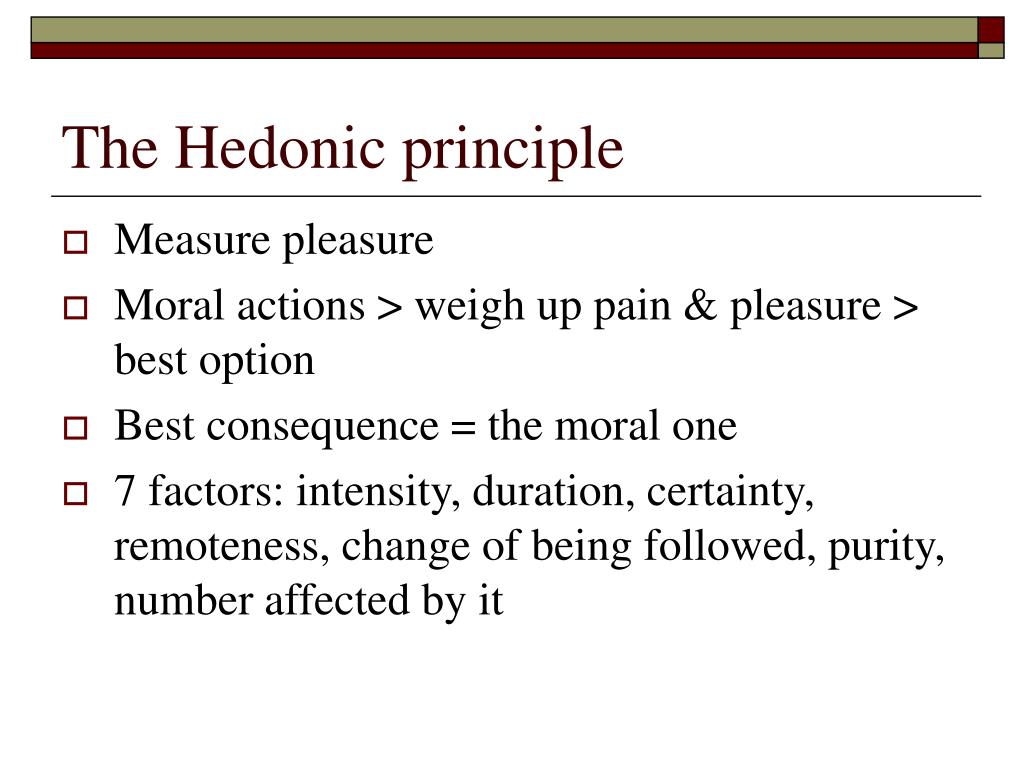
: devoted to the pursuit of pleasure : of, relating to, or characterized by hedonism a hedonistic lifestyle a city known for its wild, hedonistic nightlife The unabashedly hedonistic Allen pursued the good life for two or three years after leaving Microsoft.- What are the concepts of the hedonistic calculus?īentham’s Hedonic Calculus identifies several aspects of pleasure that contribute to its value, including certainty, propinquity, extent, intensity, and duration. The act utilitarian considers only the results or consequences of the single act while the rule utilitarian considers the consequences that result of following a rule of conduct. There is a difference between rule and act utilitarianism. What is the difference between rule and act utilitarianism? Hedonistic terms like intensity, duration, fecundity, and likelihood, imply that pleasure can be measured quantitatively, perhaps on a scale from 1-10, as part of a hedonistic calculus. Many utilitarians believe that pleasure and pain are objective states and can be, more or less, quantified. The felicific calculus is an algorithm formulated by utilitarian philosopher Jeremy Bentham (1747–1832) for calculating the degree or amount of pleasure that a specific action is likely to induce. What is the purpose of felicific calculus? But for the utilitarian, all that matters is the net gain of happiness. It is wrong to punish an innocent person, because it violates his rights and is unjust. … Utilitarianism seems to require punishing the innocent in certain circumstances, such as these. Utilitarianism’s primary weakness has to do with justice. intensity, duration, certainty, propinquity, fecundity, purity, and extent. It is a way of determining how great a pain or pleasure will be by the use of a certain action. The hedonic calculus lists seven features of pleasure to which attention must be paid in order to assess how great it is. … Given its insistence on summing the benefits and harms of all people, utilitarianism asks us to look beyond self-interest to consider impartially the interests of all persons affected by our actions. Perhaps the greatest difficulty with utilitarianism is that it fails to take into account considerations of justice. Actions Are Right Insofar as They Promote Happiness, Wrong Insofar as They Produce Unhappiness.Pleasure or Happiness Is the Only Thing That Truly Has Intrinsic Value.There are three principles that serve as the basic axioms of utilitarianism. What are the 3 principles of utilitarianism? Utilitarianism is a tradition of ethical philosophy that is associated with Jeremy Bentham and John Stuart Mill, two late 18th- and 19th-century British philosophers, economists, and political thinkers. : a method of determining the rightness of an action by balancing the probable pleasures and pains that it would produce. Which is better utilitarianism or kantianism?.Does utilitarianism violate human rights?.How does Mill think we can distinguish between pleasures of higher and lower quality?.How valuable is the hedonic calculus weighing pleasures and pains in making good decisions?.What are the main arguments against utilitarianism?.What is the weakness of consequentialism?.What are the concepts of the hedonistic calculus?.What is the difference between rule and act utilitarianism?.What is the purpose of felicific calculus?.What are the 3 principles of utilitarianism?.Two tables and 71 references are included. Two implications of the study are noted: first, deterrence and social control theory may be related along some conceptual continuum and second, deterrence should remain a relevant area for innovative research. The deterrent residual correctly reported and predicted the likelihood of engaging in both marijuana use and vehicular speeding. A survey instrument was administered to a stratified random sample of 579 subjects attending 2 campuses of a southeastern community college this yielded responses from 541 subjects. In addition, several assumptions about the research variables were made for example, it was assumed that subjects would correctly report the degree to which they were engaging in each illegal act (marjuana use and speeding). Techniques of perceptual survey analysis were used to operationalize Bentham's hedonistic calculus.

The Benthamite rationale suggests that differing perceptions of pain-pleasure must be accounted for in any measurement of deterrence and that a deterrent effect can logically be expected to occur only if the magnitude of perceived pain-in-punishment is greater than the pleasure expected from engaging in an illegal act. Bentham's theory holds that although members of society share common interests which must be protected, not all individual members have these same interests.


 0 kommentar(er)
0 kommentar(er)
